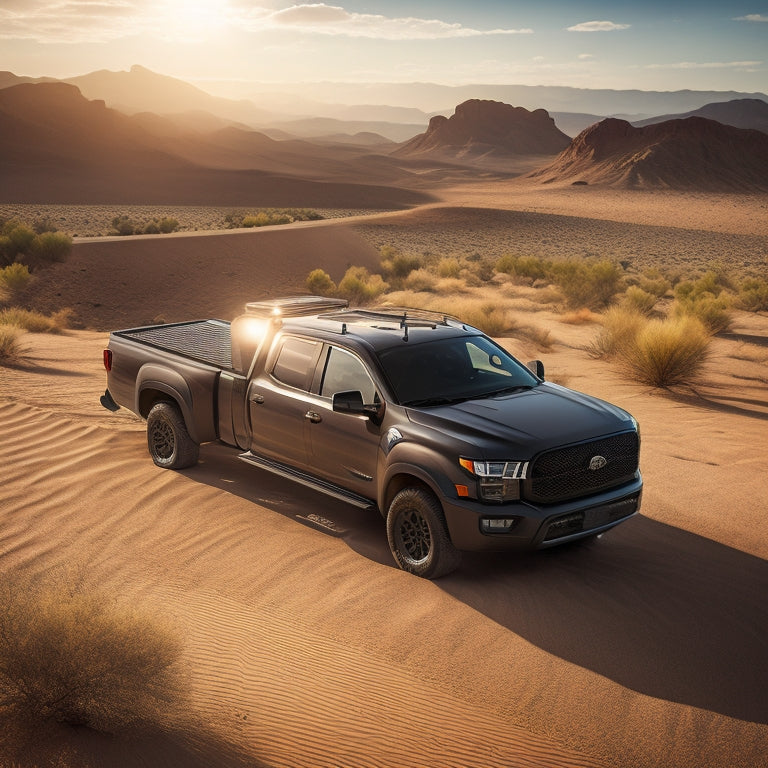
What Are the Best Solar Panels for Trucks?
Share
You're looking for the best solar panels for your truck, and that means finding a reliable and efficient system that can keep up with your fleet's demands. Monocrystalline panels offer higher efficiency rates and perform better in low-light conditions, while polycrystalline panels are a cost-effective option. Top brands like Renogy, HQST, and WindyNation prioritize reliability, durability, and efficiency. When buying, consider factors like efficiency ratings, conversion efficiency, and power output capacity. By investing in the right solar panels, you can reduce fuel consumption, decrease operating costs, and lower your fleet's carbon footprint - and that's just the beginning of your journey to a more sustainable fleet.
Key Takeaways
• Consider top brands like Renogy, HQST, and WindyNation for high-performance solar panels designed for commercial vehicles.
• Monocrystalline panels offer higher efficiency rates and perform better in low-light conditions, making them a popular choice for trucks.
• Key features to consider when purchasing solar panels include efficiency ratings, conversion efficiency, temperature coefficient, durability, and power output capacity.
• Roof-mounted, trailer-hitched, and bed-mounted systems are popular installation options for trucks, ensuring compliance with building codes and regulations.
• Solar panel systems can save on fuel and maintenance costs, offering potential energy savings of up to $400 per year and a substantial ROI over their lifespan.
Types of Solar Panels for Trucks
When selecting solar panels for your truck, you'll encounter two primary types: monocrystalline and polycrystalline solar panels, each with its own set of benefits and drawbacks.
Monocrystalline solar panels are made from a single crystal of silicon, resulting in higher efficiency rates and better performance in low-light conditions. They're ideal for truck beds with limited space, as they produce more power per hour. However, they're more expensive than polycrystalline panels.
Polycrystalline solar panels, on the other hand, are made from multiple silicon crystals, making them less expensive to produce. While they're less efficient than monocrystalline panels, they still provide reliable power and are a cost-effective option for truck owners.
When integrating solar panels into your truck bed, consider the space available, your power needs, and your budget. Both types can be safely integrated into your truck's electrical system, providing a reliable source of power on the go.
Benefits of Solar Power for Fleets
As you consider integrating solar panels into your truck's electrical system, you'll likely want to scale up to a fleet-wide implementation, and that's where the benefits of solar power for fleets really start to shine.
By shifting to solar power, you can greatly reduce your fleet's fuel consumption, resulting in substantial fuel savings. This, in turn, leads to a decrease in your fleet's overall operating costs.
Additionally, solar power reduces your fleet's reliance on fossil fuels, which has a direct impact on the environment. By switching to solar, you'll be reducing your fleet's carbon footprint, contributing to a cleaner environment, and minimizing your environmental impact.
Solar-powered fleets can also benefit from reduced maintenance costs, as solar panels require minimal upkeep and have a long lifespan. By making the switch to solar, you'll not only be doing your part for the environment, but you'll also be saving money and increasing the efficiency of your fleet operations.
Top Brands for Commercial Vehicles
You'll find that top brands for commercial vehicles, such as Renogy, HQST, and WindyNation, offer a range of high-performance solar panels specifically designed to meet the unique demands of fleet operations. These brands understand the importance of reliability, durability, and efficiency for commercial fleets, providing solutions that cater to the specific needs of trucks and vans. By choosing a reputable brand, you can guarantee your fleet is equipped with high-quality solar panels that provide consistent power output, even in harsh weather conditions.
Brand loyalty is essential in the commercial solar panel market, as it translates to better support, warranties, and maintenance. Reputable brands offer fleet discounts, making it more affordable to outfit your entire fleet with solar panels. This not only reduces your carbon footprint but also increases your return on investment.
Look for brands that provide extensive warranties, dedicated customer support, and a proven track record of delivering high-performance solar panels for commercial vehicles. By partnering with a trusted brand, you can ensure a seamless integration of solar power into your fleet operations, maximizing your benefits and minimizing downtime.
Key Features to Consider Buying
When selecting the best solar panels for your truck, you'll want to scrutinize the key features that impact performance.
You'll need to take into account the efficiency ratings, which directly affect how much power your panels can generate.
Additionally, you'll want to evaluate the durability of the panels in harsh environmental conditions and their power output capacity to make sure they can meet your energy needs.
Efficiency Ratings Matter
Your truck's solar panel efficiency rating greatly influences how much power you can generate on the go, making it an important factor to take into account when making a purchase. A higher efficiency rating means more power output per hour of sunlight, which is vital when you're off-grid and relying on your solar panels to keep your batteries charged.
When evaluating efficiency ratings, look for the panel's conversion efficiency, which is the percentage of sunlight converted into electrical energy. A higher conversion efficiency translates to more energy yield and better panel performance. For instance, a 20% efficient panel will produce more power than a 15% efficient panel of the same size.
Additionally, consider the temperature coefficient, which affects the panel's performance in high temperatures. A lower temperature coefficient guarantees the panel maintains its efficiency even in hot conditions. By prioritizing efficiency ratings, you can maximize your energy yield and ensure a reliable power source for your truck's electrical systems.
Durability in Harsh Conditions
Since solar panels on your truck are exposed to harsh environmental conditions, it's crucial to select a model that can withstand the elements, and that's where durability comes into play.
When you're on the go, you can't afford to have your solar panels failing on you due to weather conditions. That's why you need solar panels with rugged construction, designed to withstand the rough and tumble life on the road.
Look for solar panels with weather-resistant materials, such as anodized aluminum frames and tempered glass, which can withstand extreme temperatures, rain, and even hail. A durable solar panel will guarantee that you have a reliable source of power, no matter the conditions.
You should also consider solar panels with IP67 or higher ratings, which provide protection against dust and water ingress.
When shopping for solar panels, don't compromise on durability. A high-quality solar panel will save you from the hassle of frequent repairs and replacements, ensuring you stay powered up and on the move.
Power Output Capacity
The power output capacity of your solar panels, measured in watts (W), determines how quickly you can recharge your truck's batteries, making it a critical factor to take into account when buying. As you consider your options, think about your energy needs and how much power you require to keep your batteries charged. A higher power output capacity means you'll recharge your batteries faster, which is especially important if you're off-grid for extended periods.
When evaluating power output capacity, look for panels with high energy density, which refers to the amount of power generated per unit area. This is vital for trucks, where space is limited.
Additionally, examine the power curves of different panels, which illustrate how power output changes in response to varying sunlight conditions. A panel with a more consistent power curve will provide a more reliable charging experience.
Solar Panel Maintenance and Care
As you invest in the best solar panels for your truck, you'll want to guarantee they remain efficient and effective over time.
To do so, you'll need to prioritize regular cleaning to remove debris and dirt that can hinder energy absorption.
Cleaning Solar Panels
You'll need to clean your solar panels regularly to maintain their efficiency, as dirt, dust, and debris can reduce their energy output by up to 25%.
When it comes to panel maintenance, dirt removal is essential. Start by inspecting your solar panels for any visible debris, such as leaves or twigs. Gently sweep or blow away any loose particles to prevent scratching the panels.
Next, mix a solution of mild soap and water, and use a soft-bristled brush or a cleaning pad specifically designed for solar panels to gently scrub the surface. Avoid using harsh chemicals, abrasive materials, or high-pressure washes, as they can damage the panels' surface.
Rinse the panels thoroughly with distilled water to remove any soap residue. Regular cleaning will make sure your solar panels operate at their highest efficiency, providing you with the maximum amount of power for your truck.
Storage and Handling
By keeping your solar panels clean, you're now ready to focus on storing and handling them properly when not in use, ensuring they remain in pristine condition. Proper storage and handling are essential to maintaining the longevity and efficiency of your solar panels.
When storing your solar panels, make sure to use secure racking systems that prevent damage and scratches. This will also prevent electrical shock hazards. Always handle your solar panels with care, avoiding abrupt movements or drops that can cause damage to the glass or frames.
Wear protective gear, such as gloves and safety glasses, to prevent injury from broken glass or sharp edges. When transporting your solar panels, ensure they're securely fastened to your truck or trailer to prevent damage or loss during transit.
Installation Options for Trucks
Truck owners can choose from three primary installation options: roof-mounted, trailer-hitched, or bed-mounted systems, each with its unique set of benefits and challenges.
When it comes to roof-mounted systems, you'll need to take into account the weight capacity of your truck's roof and make sure that the solar panels are securely fastened to the roof racks. This option provides a sleek, low-profile installation, but may require additional structural support.
For trailer-hitched systems, you'll need to invest in a sturdy hitch mount that can withstand the added weight and stress of the solar panels. This option offers more flexibility, as you can detach the trailer when not in use.
Bed-mounted systems, on the other hand, provide a more permanent installation, but may require additional modifications to your truck bed.
Regardless of the installation option you choose, it's crucial to consider factors such as wind resistance, water tightness, and electrical connections. You'll also need to make sure that your installation complies with local building codes and regulations.
Cost and ROI of Solar Panels
The cost of solar panels for your truck can vary widely, depending on factors such as the type and quality of the panels, the installation option you choose, and the size of the system you need. On average, a solar panel system for your truck can cost between $1,000 and $5,000. However, with tax incentives, you can greatly reduce the upfront cost. The Solar Investment Tax Credit (ITC) allows you to claim a tax credit of 26% of the total cost of your solar panel system. This can help you save thousands of dollars on your taxes.
In addition to the upfront cost, it's critical to take into account the long-term energy savings. Solar panels can help you reduce your reliance on fuel-powered generators, saving you money on fuel and maintenance costs. According to the US Department of Energy, solar panels can save you up to $400 per year on energy costs. With a typical lifespan of 25 years or more, solar panels can provide a substantial return on investment (ROI) over time.
Popular Solar Panel Configurations
You'll typically choose from three popular solar panel configurations to suit your truck's energy needs: roof-mounted, hood-mounted, or foldable portable systems. Each configuration has its advantages and disadvantages, depending on your specific requirements and preferences.
Roof-mounted systems are a popular choice, offering a sleek, low-profile design that's ideal for trucks with limited roof space.
Hood-mounted systems provide more flexibility, allowing you to adjust the angle and direction of the panels for best energy harvesting.
Foldable portable systems, on the other hand, offer the ultimate in convenience, allowing you to set up and stow away the panels as needed.
When selecting a configuration, consider the Mounting Options and Wiring Schemes that best suit your truck's electrical system. Make sure that the chosen configuration is compatible with your truck's electrical architecture to avoid any safety hazards.
A well-designed Wiring Scheme is critical to ensure efficient energy transfer and minimize the risk of electrical shocks or fires. By carefully evaluating your energy needs and selecting the right configuration, you can enjoy reliable, off-grid power for your truck.
Frequently Asked Questions
Can I Install Solar Panels on a Leased Truck?
Before installing solar panels on your leased truck, you'll need to check your lease agreement for restrictions, as modifications may violate terms, and consider the potential impact on your insurance premiums and coverage.
Are Solar Panels for Trucks Affected by Weather Conditions?
"When it rains, it pours," but you're wondering how weather conditions affect solar panels on your truck. Humidity impact is minimal, but cloud coverage reduces energy output; plan for 10-20% loss on overcast days, ensuring your safety and energy needs.
Do Solar Panels Drain Truck Batteries at Night?
You needn't worry; solar panels won't drain your truck's battery at night, thanks to a built-in feature that disconnects the panel from the battery when it's not generating power, ensuring your Deep Cycle battery's Power Reserve remains intact.
Can I Use Solar Panels With Truck Refrigeration Units?
You can safely use solar panels with truck refrigeration units, provided that you verify the solar panel's output matches the refrigeration unit's power requirements, and the system is designed with appropriate solar compatibility and refrigeration capacity in mind.
Are There Any Government Incentives for Truck Solar Panels?
You can claim federal Tax Credits, State Rebates, and Federal Grants for installing solar panels on your truck, supporting renewable energy adoption and reducing your carbon footprint, while ensuring a safer, more sustainable transportation operation.
Related Posts
-

3 Best Eco-Grants for Home Energy Upgrades
You're eligible for various eco-grants that can help you cut down on energy bills and reduce your carbon footprint by...
-

3 Earth-Loving Furniture Tips for Energy-Smart Homes
When furnishing your energy-smart home, you have the power to reduce your carbon footprint greatly by making consciou...
-

What Air Purifiers Save Energy in Work Areas?
You can cut energy costs and reduce your carbon footprint by choosing air purifiers designed with energy efficiency i...


